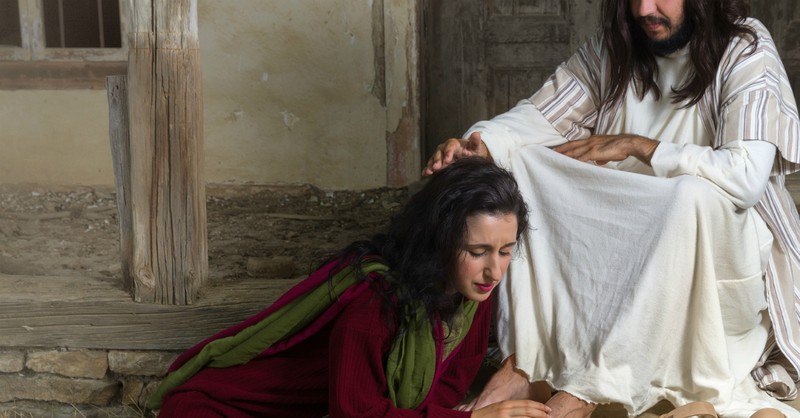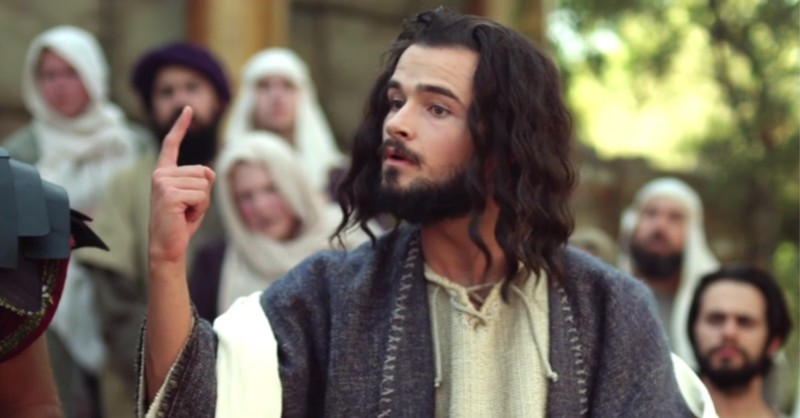
Everything about Jesus seemed to cause a stir. He had a way of taking the ideas and traditions of the times and flipping them upside down, especially the ones surrounding religion. His words and his ways were so countercultural that nearly everything he did and said was revolutionary. Following him often meant a complete 180 degree about-face turn from following the societal norms.
Matthew 9 is riddled with example after example of Jesus’ words and actions that went against the mainstream ideology of the day, making people rethink everything.
Photo Credit: © Getty Images/Shutter2U

Jesus’ Uncomfortable Model of Mercy
First, early in this chapter, Jesus encountered a paralyzed man who would have been considered cursed and taboo by his community. Jesus didn’t just disregard this man and pass by him, as others would have done. Jesus healed him and, even though it was considered blasphemy, He forgave his sins.
Then Jesus chose a tax collector, a man who was hated and considered to be a corrupt traitor, to be one of his followers. This man would have been despised and avoided by his own people, but Jesus went against the grain again and invited this outcast to be his disciple.
After this, Jesus did something even more unthinkable. He gathered together with a group of sinners and tax collectors. Instead of condemning them and judging them, Jesus lovingly sat down to share a meal with them.
These behaviors would have been completely opposite those of anyone else at the time, especially the other religious leaders and teachers. Never would they have associated with outcasts and sinners, let alone heal them or invite them anywhere. In fact, the people who witnessed Jesus do these things were so shocked that they went to the disciples to accusingly question Jesus’ behavior.
Photo Credit: © Getty Images/Studio-Annika

What Would You Have Done?
Imagine that you were there. You witness Jesus stooping down to the mat of a paralyzed man everyone else stepped over so that he could look the man in the eyes and heal his body and soul. Then Jesus walks over to the booth of the most hated man in town. The man probably expects to be ridiculed or spit at, but Jesus smiles and extended the man an invitation to be his friend and follower. The two walk towards the man’s home and Jesus sat at his table, welcoming all those who were rejected because of their sinful ways.
You anxiously watch as people respond with surprise, shock, and even anger. Then you overhear the Pharisees sneeringly question the disciples. You see that Jesus also heard. He opens his mouth to respond to them and you listen, in awe of all that is transpiring.
Matthew 9:11-13 NIV takes us to that moment:
When the Pharisees saw this, they asked the disciples, “Why does your teacher eat with the tax collectors and sinners?” On hearing this, Jesus said, “It is not the healthy who need a doctor, but the sick. But go and learn what this means: ‘I desire mercy, not sacrifice.’ For I have not come to call the righteous, but sinners.”
Photo Credit: © Deaf Missions and Jesus Film Project

Overturning the Comfortable and Familiar
I can’t even imagine the uproar this would have caused among the people! They would have been floored by such a proclamation. The religious elite would have been outraged. This statement went against so much of what their culture deemed acceptable.
But why was this so revolutionary? What did Jesus even mean when he said, “I desire mercy, not sacrifice.’?
What makes this quote significant is that Jesus restated what would have been familiar to the people, but in true Jesus fashion, he was doing it in a way that looked different to what had become comfortable and familiar.
Throughout the Old Testament, the religious rules stated that certain burnt offerings and sacrifices were often made to atone for sins when the people broke one of God’s commandments, which meant that when the people were offering their sacrifices and burnt offerings, it was because they had sinned and strayed from God’s ways. God had told the people that there was something he desired of them more than he desired their sacrifices and burnt offerings.
Listen to 1 Samuel 15:22 NIV. “But Samuel replied: “Does the Lord delight in burnt offerings and sacrifices as much as in obeying the Lord? To obey is better than sacrifice, and to heed is better than the fat of rams.””
Jeremiah 7:22-24 NIV says something similar. “For when I brought your ancestors out of Egypt and spoke to them, I did not just give them commands about burnt offerings and sacrifices, but I gave them this command: Obey me, and I will be your God and you will be my people. Walk in obedience to all I command you, that it may go well with you. But they did not listen or pay attention; instead, they followed the stubborn inclinations of their evil hearts. They went backward and not forward.”
Proverbs 21:33 NIV makes it clear. “To do what is right and just is more acceptable to the Lord than sacrifice.”
Photo Credit: © Getty Images/ginosphotos

More Powerful Than Offerings and Sacrifice
God did not want the peoples’ sacrifice, He wanted their obedience to His commandments in the first place. God gave the people commandments and laws to obey because He wanted them to stay in a right relationship with Him, and with one another. Instead of offering sacrifices to follow the religious rules and make up for their disobedience and rebellion, God longed for His people to just obey Him.
Jesus’ words in Matthew 9:13 were to remind the people of that very same thing: God did not want His people to simply follow the religious rules, He wanted them to obey Him so that He could bless them and so that they could be in a right relationship with Him and in right relationship with one another.
But, as per his usual, Jesus took it a step further. He didn’t just restate the same scriptures that the people were familiar with. He made an application that caused people to look deeper and to question the cultural norms.
Photo Credit: © Unsplash/Shaun Frankland

Loving God Means Loving His People
When asked what the greatest commandment was that God’s people should follow, Jesus made a revolutionary statement in Matthew 22:37-40 NIV when he replied: “‘Love the Lord your God with all your heart and with all your soul and with all your mind.’ This is the first and greatest commandment. And the second is like it: ‘Love your neighbor as yourself.’ All the Law and the Prophets hang on these two commandments.”
Jesus was tying the Old and the New Testament together. He was illustrating the difference between the old and the new covenant. Jesus was telling the people that God did not want their sacrifices, He wanted their hearts. He wanted them to obey out of love for Him. Then Jesus showed people, through his words and through his actions, what that obedience looked like.
Jesus displayed that obeying God meant loving Him with their whole heart and loving His people. It meant getting face to face with a paralyzed man, inviting a tax collector, sitting down to dinner with sinners, and radically choosing the love of God and the love of people over the rules of religion.
Jesus changed everything. His upside down kingdom caused people to look at their relationship with God and with one another differently.
Bobbie Schaeperkoetter is a writer, speaker, women’s ministry leader, community builder, and an encourager of women. You can find her at https://www.bobbieschae.com. She’s passionate about connecting women to Jesus, to one another, and to the Body of believers. You can connect with Bobbie through her website or on Instagram at https://www.instagram.com/bobbieschae or on Facebook at https://www.facebook.com/bobbieschae
Getty Images: © Getty Images/Yacobchuk
Originally published Wednesday, 03 June 2020.



